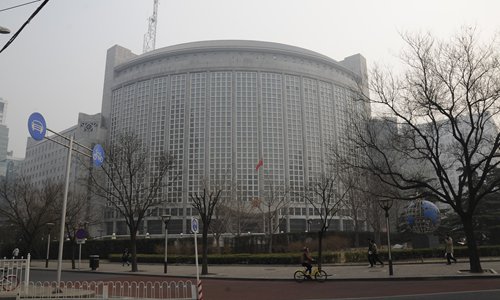HOME >> WORLD
Washington’s missile plan sparks concerns
Source:Global Times Published: 2019/8/6 22:43:40
China will be forced to take countermeasures: official

A general view of Chinese Foreign Ministry Photo: VCG
China is very concerned about plans by the US to develop and test a land based intermediate-range missile in the Pacific region after the US' withdrawal from the Intermediate-Range Nuclear Forces (INF) treaty, the Chinese Foreign Ministry said on Tuesday."We are particularly concerned that some senior US officials are saying that the US is planning to deploy intermediate-range missiles in the Pacific region 'sooner rather than later,'" said Fu Cong, Director-General of the Department of Arms Control of Chinese Foreign Ministry.
Fu's comments came days after US Defense Secretary Mark Esper said the US was free to deploy the weapons following its withdrawal last week from the INF treaty with Russia.
"We call on the US to maintain restrained … China will not stand idly by and will be forced to take countermeasures if the US deploys intermediate range ground-based missiles in this part of the world," Fu told a news conference on Tuesday.
Fu did not elaborate on what China's countermeasures will be, but said "everything is on the table."
The INF treaty, signed in 1987 between then-bipolar Soviet Union and the US, saw Moscow and Washington agreeing to limit the use of conventional and nuclear missiles with a range of 500-5,000 kilometers, and was considered a cornerstone of global arms control.
"We also call on our neighboring countries to exercise prudence and not to allow US deployment on its territory, because that will not serve the national security interests of these countries," Fu said.
Experts predicted that the US is considering putting its missile systems on Guam, which is around 3,000 kilometers away from the Chinese mainland coastline, putting the most part of China in range.
"For a country that has experienced the Cuban missile crisis, American people would understand China's feelings when it comes to the US deployment of missiles at the doorsteps of the Chinese territory," said Fu.
The Cuban missile crisis was a 13-day stand-off between the US and the Soviet Union, initiated by the American discovery of Soviet ballistic missile deployments in Cuba.
"If you put more missiles on a piece of land like Guam, it will be viewed as a very provocative action of the US and can be very dangerous," Fu said. "China will be forced to take countermeasures and that would not help any country's security."
China has no interest in participating in a trilateral nuclear arms reduction negotiation with Russia and the US, as there is a huge gap in the nuclear arsenals of China, US and Russia.
"It is also the view of the international community that the US and Russia should maintain the existing arms control treaties, and continue to further cut the huge nuclear arsenals so as to create conditions for other countries to participate in this process," Fu said.
China is not prepared to participate in the trilateral negotiation, but that does not mean China is not participating in the international nuclear disarmament efforts, Fu said, stressing that China is not going to participate in an arms race.
"China has never participated in a nuclear arms race, and China will not participate in one. This has been clearly laid out in the newly published White Paper on Chinese National Defense," Fu said.
"China pursues a peaceful foreign policy and defensive defense policy. And China sticks to the policy of no first use of nuclear weapons, and over the decades China has exercised maximum restraint in the development of its nuclear capabilities," he noted.
RELATED ARTICLES:
Posted in: ASIA-PACIFIC,WORLD FOCUS